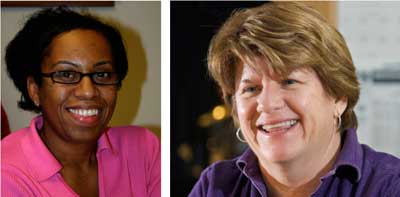Shifting the Paradigm of Health Care in Haiti

Nadia Raymond, RN and Annie Lewis-O’Connor, PhD, MPH, NP
On Jan. 26, Nadia Raymond and I would meet for the first time at Logan Airport destined for Haiti. We are both nurses at Brigham and Women’s Hospital, and were going to Haiti to support nursing care through the organization Partners In Health. Nadia would go to Cange and I would go to St. Marc about 100 miles apart. Every night we would text each other about our very similar experiences and discuss ways we could enhance and promote the practice of nursing with the Haitian nurses and doctors.
There are many health care issues that have been identified that give pause for great concern in Haiti: dengue fever, malaria, tuberculosis, hepatitis, malnutrition and HIV just to name a few. The earthquake left more than 250,000 people injured and some 2 million people are homeless in the nation of 9 million and estimates suggest some 4,000 people have lost a limb. What might be a common thread in addressing primary, secondary and tertiary care? We propose that it is nursing care and that the Haitian nurses need to be at the table for those discussions.
Nursing is recognized worldwide as a profession that has focused on the care of individuals, families and communities through intervention and prevention with the goal of improving health and quality of life across the lifespan. Nursing may well be the anchor to any effective health care system. We witnessed first hand the general sense that Haitian nurses wanted to do more, wanted to learn more. With the collapse of the State Nursing School in Port au Prince and the death of more than 150 nursing students and faculty, there is genuine concern about how nursing practice will move forward. All of the best of medicine from around the world and within Haiti will not change the outcomes if patients do not receive basic nursing care.
We witnessed first hand the strengths and challenges that Haitian nurses faced. We saw babies brought in for diarrhea and dehydration who were gravely ill; had they only come in earlier they might have been saved. Community health nurses and midwives provide the majority of health care to pregnant women. We witnessed a lack of systems that support the practice of nursing- many were basic: name tags for the patients, a white board to keep track of patient care, documentation, administration of heparin to prevent clots for those bedridden following the earthquake and education materials to name a few. We witnessed the need for mass vaccination to prevent disease which the Haitian Ministry of Health is now addressing. We saw so much opportunity to improve the practice of nursing and believe that by improving the delivery of nursing care there will be a significant improvement in patient outcomes.
As we processed our experience, we concluded that moving the paradigm of health care practice would require a multi-pronged approach that includes: 1) enhancing the nurses knowledge by promoting evidence based care in the context of cultural norms, available resources and skill building; 2) promoting community education through community health workers; 3) expanding the role of the nurse by fostering networking and coalition building that would have a broader and greater impact on communities; 4) developing strategies in concert with key stakeholders that would influence health policy in Haiti
In summary, any restructuring and allocation of health care services must include nurses. Shifting the paradigm of healthcare in Haiti will require collaborative efforts that expand nursing practice through education and partnerships. It is imperative to engage key Haitian stakeholders and organizations such as Partners In Health, an organization that has been providing healthcare services in Haiti for over 25 years and employs over 600 nurses and 2,500 community health workers and works in concert with the Ministry of Health. Strategically, conducting on going needs assessments around health needs, identifying bench marks and outcome evaluations will help guide and inform the process. We believe that by improving nursing practice there will be better health outcomes. Let’s be sure that nursing is recognized in the process of addressing the health care needs in Haiti.
Annie Lewis-O’Connor is the program director of Nursing Practice, Center for Women and Newborns, and Nadia Raymond is a registered nurse in the ICU Float Pool.